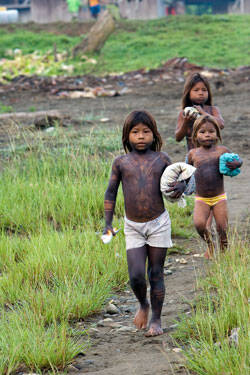It hosts by most accounts the world’s second largest population of internally displaced people—3.4 million dislocated by civil war and violence related to drug trafficking. Its internal conflict, now in its fourth decade, has led to the deaths of thousands and created border tensions with many of its neighbors even as it has made its own citizens miserable. So why does Colombia’s endless civil war and the regional effects it provokes remain an internal matter? When will the problem of its dislocated citizens, many of them indigenous people, and their struggle to meet basic needs get the attention it deserves at the U.N. Security Council?
Those are two questions that have long troubled Joseph Donnelly, permanent delegate of Caritas Internationalis to the United Nations, especially as he participated in the World Council of Churches’ annual U.N. Advocacy Week in mid-November. Raising awareness of Colombia’s problems, especially its crisis of internally displaced persons, was one of the week’s three target themes this year, joining climate change and advocacy for the rights of indigenous people. For Donnelly, the advocacy week provides an annual opportunity for members of civil society to attempt to set the U.N. agenda rather than have global priorities dictated by the Security Council. Outside of obvious humanitarian crises, Donnelly said, “It’s probably a false premise that what’s on the Security Council agenda is really the most important global problem.... Colombia has never been on the Security Council agenda as far as I’m aware.”
Donnelly declined to speculate why that oversight might have occurred, but one permanent member of the Security Council, the United States, has been a long-term supporter of the Colombian government in its efforts to conclude its long-running conflict with the Revolutionary Armed Forces of Colombia. The United States has spent billions over the years through its Plan Colombia in military aid and drug trafficking interdiction and coca crop eradication campaigns.
Donnelly said relief and advocacy groups like Caritas should be doing a better job of highlighting the humanitarian crisis in Colombia. “How come this isn’t on the global agenda?” he asked. And even if the advocacy week is not successful in elevating Colombia’s ongoing humanitarian crisis to a Security Council priority, Donnelly asked, “Why isn’t it on our agenda?”
“How could so much be so wrong for so many people for so long” without provoking more outrage and concern from global civil society?
According to Caritas, in addition to the millions internally displaced, as many as 500,000 refugees from the complicated conflict in Colombia, which now involves right-wing militias, the revolutionary forces, the Colombian military and drug traffickers, have escaped into neighboring countries. Further complicating the conflict is the increasing footprint of the U.S. military. On Oct. 30 U.S. and Colombian officials signed the controversial Defense Cooperation Agree-ment, which grants U.S. armed forces access to seven Colombian military bases for the next 10 years.
Extrajudicial killings, land seizures and other human rights violations have long typified the conflict in Colombia. Caritas reports that the women and children within Colombia’s displaced populations face sexual abuse, forced recruitment and exploitation as cheap laborers. According to the National Reparation and Reconciliation Commission, the “typical” victim of the conflict in Colombia is a poor woman, single-head of household, who has been displaced by violence. She has only a primary school education and earns Colombia’s minimum wage. In short, her position and prospects are precarious. Women and children make up more than 70 percent of the internally displaced population.








